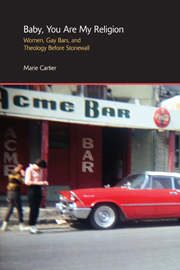Book contents
- Frontmatter
- Dedication
- Contents
- Acknowledgments
- Preface: Myrna's story
- 1 It was the only place
- Part I Interviews
- 2 The 1940s: “Thank God the Japanese surrendered”.
- 3 The 1950s: “I should have made a list of my girlfriends!”
- 4 The 1960s: “It was … Hollywood! We did a girlfriend … daisy chain!”
- 5 The 1970s: “We were … women in overalls dancing with women in overalls. they kicked us out.”
- 6 The 1980s: “I really did think I was Jess from Stone Butch Blues reincarnated.”
- Part II Theological history and contexts
- Part III The nature of “theology”
- Appendix A Demographics
- Appendix B Sources
- Bibliography
- Index
4 - The 1960s: “It was … Hollywood! We did a girlfriend … daisy chain!”
from Part I - Interviews
- Frontmatter
- Dedication
- Contents
- Acknowledgments
- Preface: Myrna's story
- 1 It was the only place
- Part I Interviews
- 2 The 1940s: “Thank God the Japanese surrendered”.
- 3 The 1950s: “I should have made a list of my girlfriends!”
- 4 The 1960s: “It was … Hollywood! We did a girlfriend … daisy chain!”
- 5 The 1970s: “We were … women in overalls dancing with women in overalls. they kicked us out.”
- 6 The 1980s: “I really did think I was Jess from Stone Butch Blues reincarnated.”
- Part II Theological history and contexts
- Part III The nature of “theology”
- Appendix A Demographics
- Appendix B Sources
- Bibliography
- Index
Summary
OVERVIEW
It was … Hollywood! We did a girlfriend … daisy chain!
The Children's Hour, released in 1961, was based on a true case. Shirley MacLaine has said that she and Audrey Hepburn—her partner in the film—never discussed that it was about homosexuality. It was about “a child's accusation”. The real-life accusation resulted in women being fired, but not prosecuted, because the court could not believe that such a thing existed. The MacLaine character screams, “I know about it now. It's there … I resented your plans to marry—maybe because I wanted you … I couldn't call it by name before, but maybe it's been there since I first knew you.” At the end of the film, after the suicide, the remaining character is supposed to marry a young man of the town but walks away without marrying. We do not know where she is headed, but it might be to New York City's fabled homosexual haven, The Village. For, when Hepburn leaves the boarding school, her costume looks remarkably like the character's costume on the cover of the original Beebo Brinker, published the very next year, when Beebo arrives in New York City, we presume to the Village.
These images contradict themselves. Beebo actually lives as a gay girl/ butch gay woman, and unlike her cover art, lives in butch or masculine clothing. In fact she will not take higher paying jobs if they demand female attire.
- Type
- Chapter
- Information
- Baby, You Are My ReligionWomen, Gay Bars, and Theology Before Stonewall, pp. 79 - 100Publisher: Acumen PublishingPrint publication year: 2013

